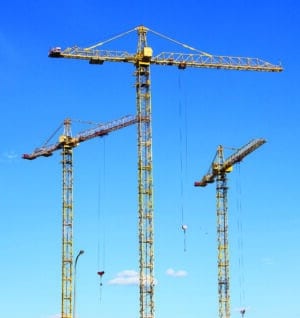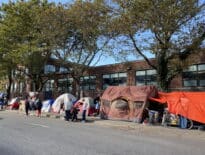Rules in Boston that set minimums for the participation of city residents, women and people of color as workers on construction projects are not being met by the vast majority of top projects.
City data obtained by GBH News shows that for the top 150 projects in Boston in the last five years, less than a third met racial equity goals, none met goals for women and three projects met goals for city residents.
In 2017, then-Mayor Marty Walsh updated rules for city-funded construction projects and private projects that exceed 50,000 square feet to require that people of color complete 40 percent of hours worked on a project, women work 12 percent of hours and city residents work 51 percent of hours.
The Boston Residents Jobs Policy was first enacted in 1983 with slightly lower participation percentages in each category: 25 percent of the hours worked by people of color, 10 percent by women and 50 percent by city residents.
Priscilla Flint-Banks, who serves on the Boston Employment Commission that oversees the jobs policy, told the broadcaster that adherence to the policy was “horrible.”
“We want to make sure that our people have jobs – that women have jobs – that Boston residents have jobs, Black people, Latino people,” she said. “It doesn’t make any sense that we would have a law like this on the book for our ordinance, and it’s not being enforced.”
The percentage of hours worked on major projects by city residents actually fell from 28 percent of hours in 2017 to 24 percent in 2020, the broadcaster found.
Celina Barrios-Millner, chief of the Boston mayor’s Equity and Inclusion Cabinet, told the broadcaster that the rules do not include penalties for projects or companies that don’t meet the minimum standards, just penalties for those who fail to report the demographics of their workforce.
“What we can enforce with the ordinance is compliance with the reporting measures, not numbers of employees and/or percentage of workforce,” she said.
The CEO of Cruz Construction, John Cruz III, said general contractors should do more to find and hire residents, people of color and women, but developers should also hire architects, engineers and lawyers who are members of those categories.
His company is a third-generation, Black-owned business that oversaw two out of the three major projects that hit the city’s metrics for resident participation. He said the workforce is out there, even if it takes a little more work to find them.
“To use that as an excuse is folly – it’s actually deception, and it’s racism,” Cruz said.




 |
| 


